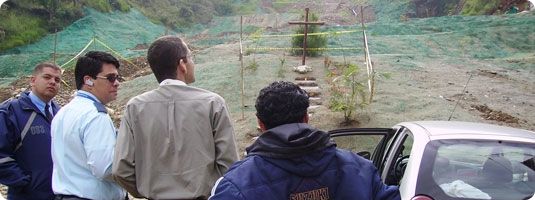Relief for Landslide Victims in Colombia

María used to have a home in Bello, an impoverished barrio (neighborhood) outside the city of Medellín, in northwest Colombia, halfway between Bogotá and the Panamanian border.
The community of Bello is marginalized, in many senses of the word. Located on the steep mountainsides north of Medellín, Bello is severely lacking in infrastructure and government services. Social cohesion is threatened by the lack of economic opportunities in the area and violence from the country’s ongoing civil war. In this situation, it is a struggle just to live and raise a family.
So when a massive landslide in December 2010 wiped out half the neighborhood, there was nothing to lessen the impact of the devastation.
María remembered the day vividly. It was raining, of course – for more than a year now, the La Niña phenomenon has brought unprecedented amounts of rain to Colombia – and then suddenly, there came a rumble. Then a noise like a huge thunderclap shook Bello as the mountainside shifted, and thousands of tons of earth slid over the neighborhood, wiping out houses and burying people alive. Residents on the other side of town heard screams, and then silence.
Once the landslide stopped, people rushed over to see what had happened and started pulling their neighbors out of the dirt and rubble. The landslide had been enormous, reaching the third floor of buildings and crushing houses as if they were made of matchsticks, often trapping people inside. At least 150 people died in the disaster, including a number of children, and many more were severely injured. Rescue efforts were hampered by the weather and lack of earth-moving equipment – for days and weeks, the smell of death hung in the air, and even now some bodies have still not been recovered.
Sadly, the landslide in Bello is just one event among thousands since the rains began in April 2010, creating an ongoing natural disaster that, although it has not received much attention in North American media, is the worst in the country’s history. Thunderstorms, floods and landslides have killed 400 people and impacted close to 3 million in 28 of the country’s 32 departments, including the capital. Nearly 10,000 homes have been destroyed, and 360,000 are in need of significant repair. The United Nations Office for the Coordination of Humanitarian Affairs (OCHA) in Colombia reports that there is a growing humanitarian crisis with unmet needs across all sectors. However, assistance has been impeded by a lack of organization and information, as well as the blockage or destruction of nearly 1,000 of the country’s roads and bridges.
In Bello, local teams have worked to clear a section of road that was covered by the landslide, but many other needs remain. The already feeble water and sanitation systems were totally destroyed, leading to outbreaks of water-borne disease and other health problems. Displaced families like María’s used to be housed in shelters or local schools, where they could be taken care of in an organized way, but now they are scattered, living with friends or relatives and not receiving the extra support that they need. Additionally, María said, people are having a very hard time dealing with the situation emotionally. “The psychological situation of the people here is not good,” she said. “At any noise, children become scared and run to the door. We need psychological attention urgently, to help people cope.”
To help meet the needs of María and her neighbors in Bello, Episcopal Relief & Development is partnering with the Episcopal Church in Colombia to provide care and support. The Church is organizing a response team with help from a local priest, who is also a police officer, and his wife, a physician. The priest has good contact with the municipal government, which can help with immediate repairs to the community’s water and sanitation systems, and support the reconstruction of homes and other buildings as part of the longer-term recovery plan. The priest’s wife has connections in the public health system and will be working to arrange medical and psychosocial care for those in need.
The team will also be working with community leaders to locate where displaced families are currently staying and conduct an assessment to find out what kinds of ongoing support are most needed, with a special focus on children’s needs. The Church is developing a longer-term plan that includes continued distribution of food and other basic necessities, as well as psychological care and other services as the neighborhood recovers from the trauma of the disaster. One idea is to plant trees on the mountain slope, one for each family that was lost, both to remember those who died and to help prevent future landslides.
“I don’t yet know when things are going to get better, and when we can feel safe in our homes again,” said María, “but hopefully with the help of the Church we can begin to live again.”
In addition to Bello, there are five other localities throughout Colombia in which Episcopal Relief & Development and the Church are providing assistance. Caring for displaced families and supporting host communities who are absorbing disaster refugees are the main concerns.
“We are grateful to be working with the Episcopal Church in Colombia, which is a strong partner with deep roots in many marginalized communities throughout the country,” said Matthew St. John, Program Officer for Episcopal Relief & Development. “We are confident that the Church’s connections and capacity for coordination will help make a real difference for people in these places.”


